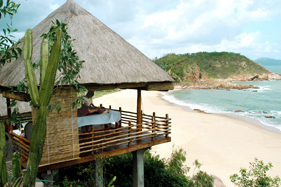Closer to Home

Local sourcing in Vietnam brings profits nearer and spreads them wider
In one of the open-air bungalows lining the Bai Dai beach in Quy Nhon, a young couple lingers over a selection of scented massage oils. In the end they pass over familiar scents from a high-end European line in favour of an exotic bark-based fragrance from the forests of Northern Vietnam.
Made from natural ingredients found in Vietnam’s remotest corners, four of these original blends were created exclusively for Life Wellness Resort in Quy Nhon. The oils are so well received by spa-goers that Life Resorts is rewriting its treatment menu to feature only local products.
"Our guests come all this way to experience what Vietnam has to offer," says Trevor Yoho, the resort’s general manager. "We purposely seek out high quality, hard-to-find local products and bring them here where they can be discovered and appreciated."
From lethargic Quy Nhon to majestic Ha Long Bay to dynamic Ho Chi Minh City, foreign hotel operators are rethinking old buying practices. Recent development has boosted the country’s manufacturing power, opening sustainable sourcing as a viable purchasing strategy.
For the first time, Vietnam’s hospitality industry is waking up to the environmental and economical benefits of buying closer to home.
The framework is now in place for properties looking to take advantage of local sourcing, says Stephen O’Grady, head of CrossKeys Hospitality and former managing director of VinaCapital Hotels and Resorts Management Ltd.
"Times have changed since the days when a hotel developer in Vietnam had to import everything from light fixtures to bed linen," says O’Grady.
Speaking from 12 years of experience at the forefront of Vietnam’s hospitality landscape, O’Grady cites furniture manufacturing as an example of a key industry where local companies have stepped up to support hotel management and design teams.
"Over the past few years Vietnam’s furniture makers have risen to the challenge, and are now supplying the majority of international hospitality projects in Vietnam," says O’Grady. "Even if certain products still need to be imported, specialized procurement companies in Vietnam are achieving best buying prices and practices that were out of the question a decade ago."
O’Grady believes that with local procurement companies, the increasing expertise of the country’s work force and its expanding list of high-quality products, hotel operators in Vietnam have greater opportunity than ever before to exceed guests’ expectations and collect a healthy return on investment.
Kurt Walter, general director of the Apple Tree Group, is among those making the most of Vietnam’s newly available commodities.
"Ten years ago, the best furniture you could buy locally was wrought iron. Our old wicker deck chairs had to be constantly replaced. Every two seasons they’d just rot away in the sea air," says Walter, speaking of the furniture rotation on the Emeraude Classic Cruises, Halong Bay.
Today, the Emeraude’s deck and bar furniture comes from a local supplier, who uses a fish bone weave technique done with modern machinery. The finished product is almost indistinguishable from real wicker, though in fact made from sturdy plastic.
"With better technology and better durability, we expect to the furniture to last three times as long, and of course we save lots of money," says Walter.
And while the bottom line is top of mind for many management teams when it comes to product sourcing, some five-star outfits like the Caravelle Hotel in Ho Chi Minh City consider buying local an ethical responsibility.
The second property in Vietnam to be awarded EarthCheck Silver Certification, the Caravelle implements a slew of eco-friendly principles in its day-to-day operations. Promoting sustainable development through local sourcing is one of them.
"Whenever possible, we buy from within Vietnam as part of our responsible purchasing strategy," says John Gardner, the hotel’s general manager. "Whether we invest in chinaware from Binh Duong, or construction materials from Dong Nai, we support the local economy. At the same time, we avoid clocking up thousands of transport miles that have a huge impact on our carbon footprint.
Further from Vietnam’s busiest tourist trails, higher standards and shortened delivery times are paving the way for local produce to reach kitchens in top hotel restaurants.
In the former Imperial capital of Hue, La Residence Hotel and Spa operates Le Parfum, the only fine-dining restaurant in a city once famed for its legendary cuisine.
Executive chef La Thua An, himself a Hue native, selects his produce from scattered points in Vietnam according to their established quality: fresh vegetables from Dalat, fish from Nha Trang, coffee from the Central Highlands, miscellaneous ingredients from Da Nang and Hanoi. All of it must meet the standards of La Residence’s five-star credentials.
Outside the kitchen as well, La Residence serves as an ideal platform for showcasing Vietnamese products to an international audience. About 90 percent of the products guests encounter at La Residence are made in Vietnam, according to the hotel’s general manager Anthony Gill. Locally made handicrafts, artwork and furniture give the property a rich, distinctively Vietnamese character.
"La Residence borrows much of its identity from the work of local businesses and artisans," says Gill. "But the sense of destination and culture our guests gain when interacting with these products is irreplaceable."
Valere Tjolle
Valere is editor of the Sustainable Tourism Report Suite 2012 Special Offers HERE
 United Kingdom
United Kingdom United States
United States Asia Pacific
Asia Pacific












































Dozens fall ill in P&O Cruises ship outbreak
Turkish Airlines flight in emergency landing after pilot dies
Boy falls to death on cruise ship
Unexpected wave rocks cruise ship
Woman dies after going overboard in English Channel